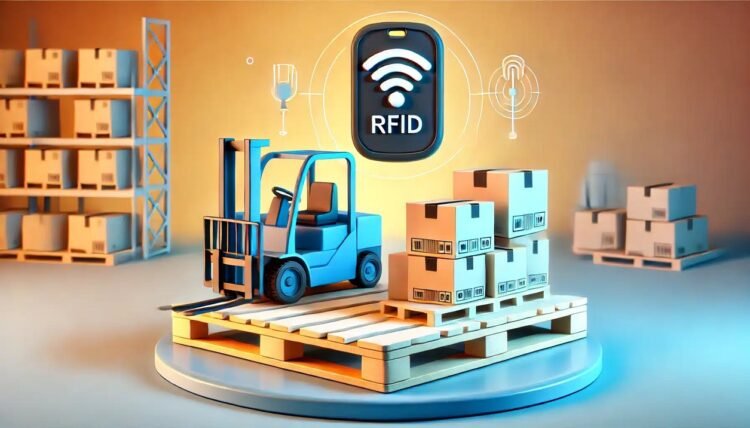Efficient logistics depends on two factors: visibility of goods and accuracy of records. Without these, supply chains face delays, misplaced shipments, and customer dissatisfaction. Businesses are increasingly turning to advanced technologies to overcome these problems, and one of the most effective tools is Radio Frequency Identification, or RFID.
Unlike traditional tracking methods, RFID provides real-time data with higher accuracy. It has become a practical solution for industries that deal with large volumes of goods and complex supply chain networks. The adoption of RFID solutions is improving the way companies monitor shipments, manage stock, and reduce costly errors.
Understanding RFID Technology in Logistics
RFID is not a new concept, but its impact on logistics has grown significantly in recent years. To understand how it helps, it is important to look at what RFID is and how its components work together.
What is RFID and How It Works
RFID stands for Radio Frequency Identification. It uses electromagnetic signals to transfer data from tags to readers. Unlike barcodes, RFID does not require a direct line of sight. This means goods can be scanned automatically, in bulk, and from a distance.
Key Components of RFID Systems
For RFID to work effectively in logistics, three main components work together—tags, readers, and software. Each plays a different role, but together they create a complete system that gives businesses better control over goods and data.
RFID Tags
RFID tags are the identifiers attached to products, cartons, or pallets. They carry stored information such as product details, batch codes, shipment IDs, or even expiry dates. Tags come in two main types:
- Active tags have their own power source, allowing them to transmit signals over longer distances. They are useful for tracking large shipments or items that move across wide areas.
- Passive tags do not have batteries and rely on the signal from the reader for power. They are smaller, cheaper, and more commonly used in warehouse and retail settings.
In simple terms, the tag is like a digital label that can be read quickly without direct scanning.
RFID Readers
Readers act as the receivers of information. They detect and capture signals from RFID tags and transfer this data into the system. Depending on usage, readers can be:
- Handheld readers, which allow staff to move through warehouses or retail spaces and scan items flexibly.
- Fixed readers, which are installed at checkpoints such as warehouse gates, conveyor belts, or loading docks. These automatically record goods as they move in and out, removing the need for manual checks.
Readers are what make RFID faster than barcode systems, as they can pick up multiple tag signals simultaneously and from a distance.
Software and Data Systems
The software is the backbone of the RFID setup. Once readers collect tag information, the software processes it into structured data. This gives managers visibility into:
- Current stock levels.
- Movement of goods across different stages of the supply chain.
- Real-time shipment status and delivery progress.
Advanced systems can also integrate with existing enterprise software like ERP or warehouse management systems, giving companies a unified view of logistics operations. In practice, this means managers can spot delays, prevent stockouts, and make decisions based on reliable data rather than guesswork.
Why Visibility and Accuracy Matter in Logistics
Visibility and accuracy are the backbone of efficient logistics. When either is compromised, the entire supply chain suffers.
Common Challenges in Tracking Shipments
Shipments often pass through multiple warehouses, ports, and transport vehicles. Without accurate tracking, it becomes difficult to know where goods are at any given time. Misplacement, theft, and delays are frequent outcomes of this gap.
The Cost of Errors in Supply Chains
Errors in shipment records or inventory counts can create expensive problems. Businesses may face stockouts, excess inventory, or failed deliveries. These issues not only increase costs but also damage customer trust.
How RFID Improves Visibility in Logistics
Visibility means having a clear, real-time picture of where goods are and how they are moving. RFID provides this through accurate data capture and instant updates.
Real-Time Tracking of Goods
With RFID tags attached to shipments, managers can see the movement of goods at every checkpoint. This includes entry into warehouses, loading onto vehicles, and final delivery.
Better Inventory Management
RFID enables instant stock counts. Unlike barcodes that need manual scanning, RFID readers can process hundreds of tags at once, reducing time and improving accuracy.
Transparency Across Supply Chain
Since RFID data is updated instantly, all stakeholders—manufacturers, distributors, and retailers—can access the same information. This creates smoother coordination and reduces disputes.
How RFID Enhances Accuracy in Logistics
Accuracy means having reliable, error-free data. RFID improves this by automating processes and minimizing human involvement.
Reducing Human Errors
Manual entries and barcode scanning often lead to mistakes. RFID automates identification and reduces the risk of incorrect data.
Automatic Data Capture
Goods with RFID tags are scanned automatically as they pass through gates or checkpoints. This eliminates the need for manual updates and ensures records stay correct.
Faster and Reliable Audits
Stock audits with manual systems can take days. RFID reduces this time to hours while ensuring complete accuracy. This helps in compliance, reporting, and planning.
Practical Benefits of RFID in Logistics
The success of any logistics technology depends on how it performs in daily operations. RFID proves its worth not in theory but through clear, measurable benefits that simplify work, cut costs, and improve service quality.
Speed and Efficiency
RFID reduces the time required for routine tasks such as stock counting, loading, and unloading. Operations become faster and more reliable.
Cost Savings for Businesses
Although initial investment is required, the reduction in errors, theft, and labor costs leads to significant long-term savings.
Better Customer Satisfaction
With RFID, customers receive accurate updates about their orders. Timely and correct deliveries improve trust and brand loyalty.
Real-World Applications of RFID in Logistics
From storage to delivery, logistics involves countless moving parts. RFID applications address these touchpoints directly, creating smoother operations and measurable business results.
Warehousing and Distribution Centers
In warehouses, RFID tracks incoming and outgoing shipments. It helps in restocking, picking, and packing processes.
Transportation and Fleet Monitoring
RFID verifies that the right goods are loaded into the correct vehicle. It also improves monitoring during transit and reduces losses.
Retail and E-commerce Fulfillment
E-commerce requires accuracy in order picking and fast delivery. RFID reduces errors in order fulfillment and ensures the correct product reaches the right customer.
Challenges of Using RFID in Logistics
The promise of RFID is strong, but businesses must also plan for its obstacles. Understanding the practical barriers helps in building strategies that make the technology truly effective.
Cost of Implementation
The cost of RFID tags, readers, and software setup is higher than traditional systems. Smaller businesses may find the upfront cost difficult to manage.
Integration with Existing Systems
Older IT systems may not support RFID integration. Businesses may need upgrades or customization to fully use the technology.
Technical Limitations
RFID signals can face interference from metals or liquids. Proper placement and system design are necessary to overcome these issues.
The Future of RFID in Logistics
Logistics is moving from manual oversight to data-driven automation, and RFID will play a defining role in this change. With technology becoming more affordable and smarter, its influence will only deepen across global supply chains.
Combining RFID with IoT and AI
When connected with IoT and AI, RFID can predict delays, monitor environmental conditions such as temperature, and suggest faster delivery routes.
Growth of Smart Warehouses
Automated warehouses rely on accurate product identification. RFID will continue to play a central role in enabling machines and robots to process goods without mistakes.
Wider Adoption in Developing Markets
As costs decrease, more companies in regions like Asia and Africa will adopt RFID. This will improve supply chain reliability and boost competitiveness.
The Role of RFID in Modern Logistics
RFID has progressed from being an optional tool to becoming a core requirement in logistics. It strengthens supply chains by providing clear visibility, improving accuracy, and lowering operational risks. Each stage of logistics: warehousing, transportation, and final delivery, benefits from reliable tracking and automated data collection.
The value of RFID lies not only in efficiency but also in the confidence it provides to businesses and customers. By minimizing human error, speeding up processes, and ensuring data-driven decision-making, RFID solutions help organizations remain competitive in a demanding market.
For companies planning adoption, selecting the right technology partner is essential. Implementing advanced systems such as an RFID reader in India can enable better tracking, reduce costly mistakes, and create a more resilient logistics operation.



















